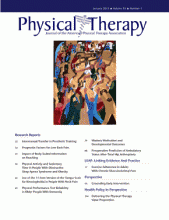<LEAP> highlights the findings and application of Cochrane reviews and other evidence pertinent to the practice of physical therapy. The Cochrane Library is a respected source of reliable evidence related to health care. Cochrane systematic reviews explore the evidence for and against the effectiveness and appropriateness of interventions—medications, surgery, education, nutrition, exercise—and the evidence for and against the use of diagnostic tests for specific conditions. Cochrane reviews are designed to facilitate the decisions of clinicians, patients, and others in health care by providing a careful review and interpretation of research studies published in the scientific literature.1 Each article in this PTJ series will summarize a Cochrane review or other scientific evidence resource on a single topic and will present clinical scenarios based on real patients to illustrate how the results of the review can be used to directly inform clinical decisions. This article focuses on exercise adherence interventions among adults with chronic musculoskeletal pain. Which, if any, approaches foster exercise adherence among adults with chronic musculoskeletal pain?
Physical activity and progressive resistance training exercises are increasingly accepted as effective interventions for people with knee and hip osteoarthritis2–6 and chronic low back pain,7 with several systematic reviews showing physical activity and progressive resistance training exercises have small to moderate beneficial effects on pain and functional activity.8–15 The beneficial effects achieved with physical activity and exercise, however, diminish as activity is ceased—as is frequently observed when intervention programs are terminated.
The 2008 Physical Activity Guidelines for Americans suggest that, on average, adults with chronic musculoskeletal conditions should engage in 150 minutes of moderate, low-impact activity (eg, walking, swimming, biking) per week and resistance training of major muscle groups 2 days per week.6,16 Adherence to these guidelines, however, is poor, with few older adults with …












